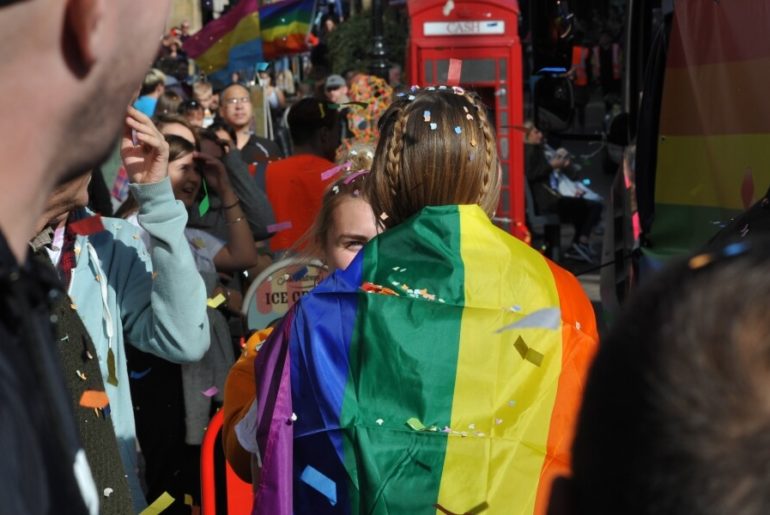Last week, The Supreme Court made a historic ruling in which they sided with LGBTQ+ employees and protected them from discrimination in the workplace.
“Today, we must decide whether an employer can fire someone simply for being homosexual or transgender,” Justice Neil Gorsuch said. “The answer is clear – an employer who fires an individual for being homosexual or transgender fires that person for traits or actions it would not have questioned in members of a different sex. Sex plays a necessary and undisguisable role in the decision, exactly what Title VII forbids.”
Gorsuch, President Trump’s first appointee to the court, referred to the Tittle VII law passed in 1964 that forbids employers from discriminating their workers based on their sex, among other things. The ruling comes as a huge victory for the LGBTQ+ community who had been fighting for workplace equality for decades.
“I am happy because of the ruling, but there is still work to be done,” Alberto Rojas, a member of the community, told Revolution English.
Rojas, like many Latinx gay men, immigrated from his country to the U.S. to escape from the various dangers of his home, including homophobia. According to Transgender Europe, Latin America has the highest rates of violence against the LGBTQ+ community. In fact, from 2018 to 2019, at least 258 trans or gender-diverse people were murdered in Latin America.
Some experts suggest that the role of Catholicism, the leading religion in the region, might have something to do with it. For years, Catholicism’s view on homosexuality has been controversial. For the religion, “being” gay and acting on it could bring different consequences for the person. And, although there are certain groups and priests within the church that would like to bring the LGBTQ+ community in, the Catholic church is still responsible for a lot of the pushback on homosexuality and transgender issues.
However, even though the history of Latin America and homophobia is extensive, new studies have found that Millennial Latinx are actually least likely to consider themselves heterosexual.
“One of the aims of our survey is to dig a bit deeper and see how race and ethnicity shape people’s experiences,” Vlad Medenica, a postdoctoral researcher who worked on the report, told NBC News. “The fact that Latinx millennials are least likely to identify as straight is a reflection of how important exploring this difference is,” he added.
Some studies suggest that this might be related to the number of immigrants who live in the U.S., where life as a gay or trans hispanic is still much easier than in Latin America. According to an NPR survey, 15 percent of the immigrants surveyed declined to reveal their sexual orientation while, in contrast, 99 percent of Latinos born in the U.S. answered the question openly.
“It is certainly much better here,” said Rojas, who has been residing in Florida for the last four years. “Here, there are actual human rights. People can actually denounce a crime. That, and the fact that there we can get married and live our lives like we want to. I could have never done that in Venezuela.”
However, even though Florida has been kinder to Rojas on a personal level, professionally he is still having to face certain obstacles. As a business owner, Rojas doesn’t mind being open about his sexuality in the restaurant that he owns with his romantic partner. They both run it together and so far haven’t faced any difficulties in doing so. However, owning a childcare center is a different story.
“I am not openly gay with the parents of the children? No,” Rojas said. “I understand there is still prejudice and there might some parents that might say that they don’t want their children to be taught in a place owned by a gay guy. I understand, and to each their own. I give my very best at my job and my personal life has nothing to do with what I do.”
Rojas is not alone in taking precautions. Accoridng to Human Rights Campaign, 46 percent of LGBTQ+ workers in the U.S. still say they are closeted at work. But, regardless of their openess in the workplace, LGBTQ+ members still face all kinds of microaggressions, like being told to dress more like their sex or hearing jokes about lesbians or gays. When asked why most of these comments go unreported, many said that they don’t think that anything would be done about it and that they worry about hurting their relationships with their coworkers. Thirty one percent of LGBTQ+ workers say they have felt unhappy or depressed at work.
“It speaks to the need for safety,” Medenica said. “The LGBTQ community is still facing a lot of discrimination, despite recent achievements in same-sex marriage and visibility in pop culture and representation lately. People are still unsafe, and creating safe environments without hate crimes is an important thing we have yet to achieve.”
However, these agressions are still much worse for their Latinx counterparts. According to a 2014 report, 15 percent of homophobic homicide victims were Latinx. Additionally, Latinx survivors of hate violence were 1.7 times more likely to experience police violence and 1.8 times more likely to experience physical violence. They are also 1.5-fold more likely to be discriminated against in the workplace.
Latinx trangender women receive the shortest end of the stick, as they experience alarmingly high rates of violence and harassment compared to other LGBTQ members, but have reported to abstain from going to the authorities out of fear of being revictimized.
“There’s still differences in experience or history, which are unique to subgroups, such as race,” Medenica explained. “We’re seeing that people recognize and are saying [LGBTQ] organizations might do good work, but the issues that affect us are very different. I think this data highlights that and points to a need for advocacy groups to think more intersectionally and broadly about their work.”

